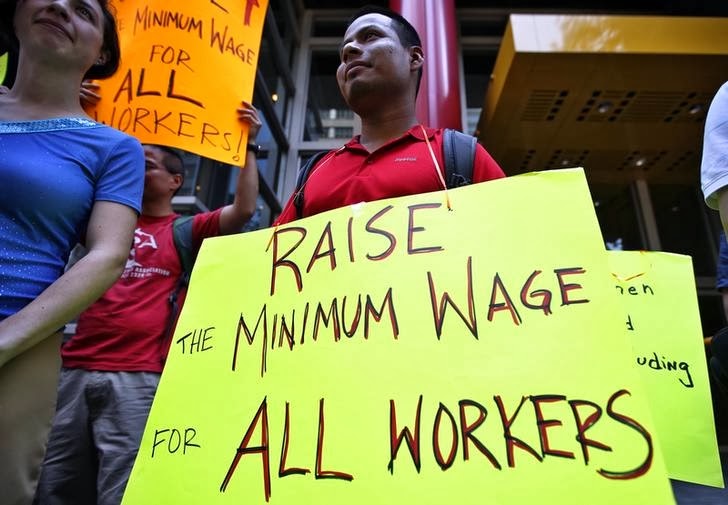Image Source: http://roseinstitute.org/wp-content/uploads/2013/12/minimum-wage.jpg
Everyone in the State of California is waiting on the upcoming incremental increase in their state minimum wage. The passage of Administrative Bill 10 last year provided for a yearly wage increase up to 2016, wherein the current per-hour rate of $8.00 will be raised to $9.00 come July this year. On 2016, the state would raise it yet again by another dollar, which would put California’s per-hour minimum wage rate at $10.00. It was the first wage hike by the state in five years and this would potentially provide around 2.4 million Californians extra earnings.
Most labor unions and organizations in the state heavily lobbied for the bill, which was authored by Assemblyman Luis Alejo (D-Salinas) (read more) and consequently won votes on both the Assembly and the Senate after it was finally signed by California Governor Edmund “Jerry” Brown. However, not all groups are in favor of the bill, especially business organizations within the state.
In fact, the California Chamber of Commerce considered the then-bill as one of the so-called “job killers.” It argued that imposing a $2.00-increase in the minimum wage over the three-year period would cause businesses, no matter how big or small they are, to incur costs despite “other economic factors or costs that California employers are struggling with to sustain their business.” While that didn’t stop the proponents of the bill to continue its passage and the imminent $9.00-increase for this year, there are still a lot of people and groups that continue to warn of its negative implications on the California economy.
The proponents of the wage increase argue that with the additional $2.00 over the next three years, poverty can be reduced and that it would help stabilize low-skilled labor due to employers being able to save on money, especially on training and recruitment. Meanwhile, those who are against it, including the state’s Chamber of Commerce, believe that this would not only cost businesses, but also promote further unemployment. Additionally, fast food restaurants and all other similar establishments see the wage increase as having a marginal impact on the prices of the goods they’re selling.
Nevertheless, the impact of the California wage increase in both employers and workers can only be felt as the law becomes effective July this year. Meanwhile, for a Los Angeles labor lawyer, employers must still focus on providing their wage earners their minimum wage, as well as overtime and meal and rest breaks, and deal with the upcoming changes later.
Sources: http://www.nerdwallet.com/blog/investing/2013/californias-minimum-wage-increase-expert-faq/
Most labor unions and organizations in the state heavily lobbied for the bill, which was authored by Assemblyman Luis Alejo (D-Salinas) (read more) and consequently won votes on both the Assembly and the Senate after it was finally signed by California Governor Edmund “Jerry” Brown. However, not all groups are in favor of the bill, especially business organizations within the state.
In fact, the California Chamber of Commerce considered the then-bill as one of the so-called “job killers.” It argued that imposing a $2.00-increase in the minimum wage over the three-year period would cause businesses, no matter how big or small they are, to incur costs despite “other economic factors or costs that California employers are struggling with to sustain their business.” While that didn’t stop the proponents of the bill to continue its passage and the imminent $9.00-increase for this year, there are still a lot of people and groups that continue to warn of its negative implications on the California economy.
The proponents of the wage increase argue that with the additional $2.00 over the next three years, poverty can be reduced and that it would help stabilize low-skilled labor due to employers being able to save on money, especially on training and recruitment. Meanwhile, those who are against it, including the state’s Chamber of Commerce, believe that this would not only cost businesses, but also promote further unemployment. Additionally, fast food restaurants and all other similar establishments see the wage increase as having a marginal impact on the prices of the goods they’re selling.
Nevertheless, the impact of the California wage increase in both employers and workers can only be felt as the law becomes effective July this year. Meanwhile, for a Los Angeles labor lawyer, employers must still focus on providing their wage earners their minimum wage, as well as overtime and meal and rest breaks, and deal with the upcoming changes later.
Sources: http://www.nerdwallet.com/blog/investing/2013/californias-minimum-wage-increase-expert-faq/











Employers must focus on providing their wage earners their minimum wage, as well as overtime and meal and rest breaks..
ReplyDeletediscrimination attorney los angeles
unpaid overtime lawyer los angeles